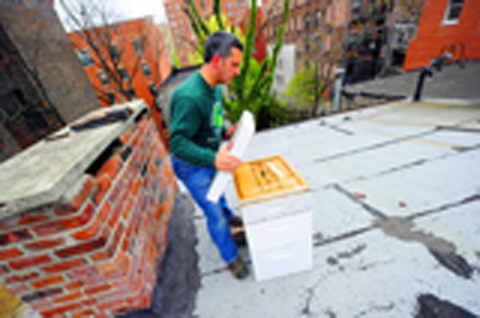Urban farming is a growth industry in New York city’s concrete jungle, and with little open land, agriculturalists and beekeepers have taken to the rooftops to pursue their passion.
Andrew Cote uses the emergency fire ladder to climb up to the roof of his East Village building, where he tends to 250 bee hives.
Cote, a professor of Japanese literature, doubles up as president of the New York City Beekeepers Association, and is happy that the city authorized beekeeping in the middle of last month after an 11-year ban.

PHOTO: AFP
“The city wants to plant 1 million trees, and the trees need to be pollinated,” Cote said.
The ban forced beekeepers into hiding, fearing a US$2,000 fine if caught. Now Cote believes the bees are vital to helping keep the city green.
“Our bees pollinate, and they clean the air. It is a way to connect with nature,” he said.
Bees also produce about 45kg of honey per hive per year, he said — honey that he sells at the city’s various farmer’s markets.
Cote said he has received several requests to install rooftop beehives, and the demand is such that yesterday he was scheduled to offer a course for aspiring apiculturalists.
On the other side of Manhattan, in the posh Upper East Side, Eli Zabar, owner of the upscale “Vinegar Factory” delicatessen, inspects the crops he is growing on the roof of the old factory bought in 1991.
“I began the green houses 15 years ago,” Zabar said. “I grow heirloom tomatoes, lots of different kinds of lettuce, herbs, basil, rosemary, thyme, raspberries, figs, beets. We use the heat of the bakeries and pastries, we recycle the heat. With the use of the heat we have eliminated our [carbon] footprint.”
“You harvest in the morning, you sell in the afternoon, you don’t refrigerate, it tastes better,” Zabar said. “We pick everything ripe and ready to eat. All our products here are organic.”
Depending on the time of day, Zabar says with a smile, “the green houses smell of bread, brownie or croissant.”
About half of the items Zabar sells in his deli comes from rooftop farms.
From Manhattan to Brooklyn, whether on rooftops, backyards or in any of the city’s 600 community gardens, urban farming is a growing phenomenon.
The movement is helped along by Mayor Michael Bloomberg, who seeks to turn the city into a sustainable development champion. Through “PlaNYC 2030,” a program he launched on Earth Day 2007, people who install “green roofs” can get a tax break.
At Randall’s Island, in New York’s East River, the city’s Parks and Recreation Department is currently testing 16 different types of vegetation that could be placed on the roofs of schools, hospitals or other public buildings.
“These are patches of succulent vegetation, like sedum, which protect the roofs, [and] isolate the buildings from the heat because the UV [ultra-violet] sun is not hitting,” senior project manager John Robilotti said.

Yemen’s separatist leader has vowed to keep working for an independent state in the country’s south, in his first social media post since he disappeared earlier this month after his group briefly seized swathes of territory. Aidarous al-Zubaidi’s United Arab Emirates (UAE)-backed Southern Transitional Council (STC) forces last month captured two Yemeni provinces in an offensive that was rolled back by Saudi strikes and Riyadh’s allied forces on the ground. Al-Zubaidi then disappeared after he failed to board a flight to Riyadh for talks earlier this month, with Saudi Arabia accusing him of fleeing to Abu Dhabi, while supporters insisted he was

The Chinese Embassy in Manila yesterday said it has filed a diplomatic protest against a Philippine Coast Guard spokesman over a social media post that included cartoonish images of Chinese President Xi Jinping (習近平). Philippine Coast Guard spokesman Jay Tarriela and an embassy official had been trading barbs since last week over issues concerning the disputed South China Sea. The crucial waterway, which Beijing claims historic rights to despite an international ruling that its assertion has no legal basis, has been the site of repeated clashes between Chinese and Philippine vessels. Tarriela’s Facebook post on Wednesday included a photo of him giving a

‘MOBILIZED’: While protesters countered ICE agents, Minnesota Governor Tim Walz activated the state’s National Guard to ‘support the rights of Minnesotans’ to assemble Hundreds of counterprotesters drowned out a far-right activist’s attempt to hold a small rally in support of US President Donald Trump’s latest immigration crackdown in Minneapolis, Minnesota, on Saturday, as the governor’s office announced that National Guard troops were mobilized and ready to assist law enforcement, although not yet deployed to city streets. There have been protests every day since the US Department of Homeland Security (DHS) ramped up immigration enforcement in the Twin Cities of Minneapolis and Saint Paul by bringing in more than 2,000 federal officers. Conservative influencer Jake Lang organized an anti-Islam, anti-Somali and pro-US Immigration and Customs Enforcement

NASA on Saturday rolled out its towering Space Launch System (SLS) rocket and Orion spacecraft as it began preparations for its first crewed mission to the Moon in more than 50 years. The maneuver, which takes up to 12 hours, would allow the US space agency to begin a string of tests for the Artemis 2 mission, which could blast off as early as Feb. 6. The immense orange and white SLS rocket, and the Orion vessel were slowly wheeled out of the Vehicle Assembly Building at the Kennedy Space Center in Florida, and painstakingly moved 6.5km to Launch Pad 39B. If the